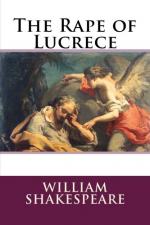|
This section contains 10,758 words (approx. 36 pages at 300 words per page) |

|
SOURCE: Kietzman, Mary Jo. “‘What is Hecuba to Him or [S]he to Hecuba?’ Lucrece's Complaint and Shakespearean Poetic Agency.” Modern Philology: A Journal Devoted to Research in Medieval and Modern Literature 97, no. 1 (August 1999): 21-45.
In the following essay, Kietzman analyzes the character of Lucrece and her role as a female complainant—a poetic trope that originated in classical verse. The critic argues that Lucrece uses her complaint to redefine herself and to come to terms with her ethical dilemma, noting that Shakespeare used this same device in Hamlet.
In his 1598 marginalia to Thomas Speght's edition of Chaucer, Gabriel Harvey differentiated Shakespeare's The Rape of Lucrece and Hamlet from Venus and Adonis, saying that “the younger sort takes much delight in Shakespeare's Venus and Adonis: but his Lucrece and his tragedie of Hamlet, Prince of Denmark, have it in them to please the wiser sort.”1 Clearly the former...
|
This section contains 10,758 words (approx. 36 pages at 300 words per page) |

|


